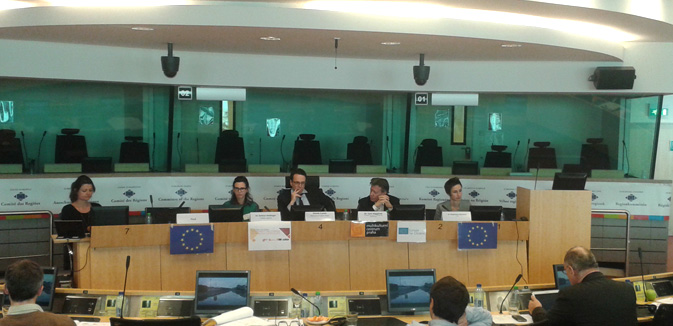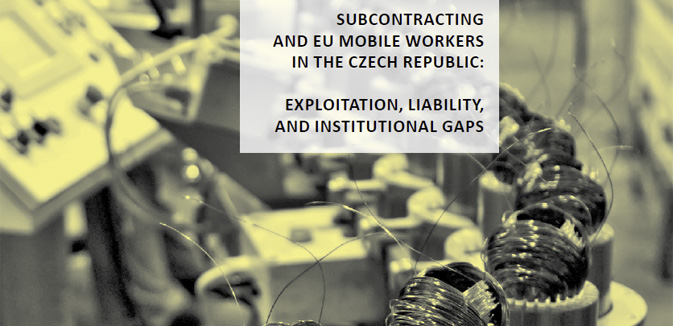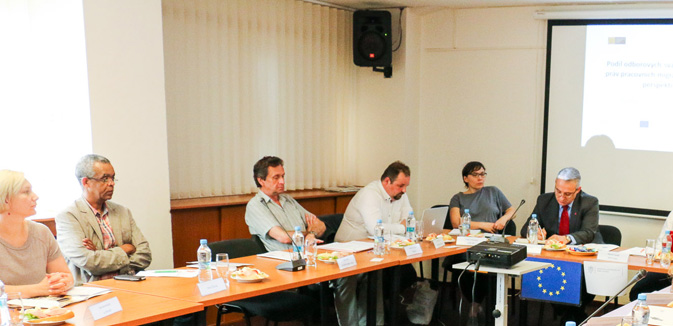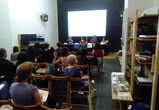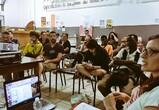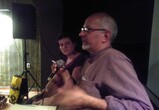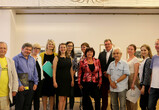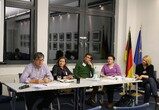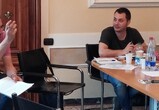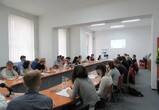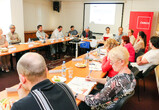Event I. - Preparatory Events
As part of the “Testing EU Citizenship as Labour Citizenship: From Cases of Labour Rights Violations to a Strengthened Labour-Rights Regime” project co-funded by the European Union under the Europe for All Citizens Programme, 5 partner countries including Czech Republic, Romania, Italy, Lithuania and Germany, are holding preparatory activities with migrant workers from various economic sectors.
The central aim of the meeting is to preliminarily map the types of labour rights violations, and to find out how the workers view their EUcitizenship as it relates to labour and mobility.
Introductory text
Italy
University of Padua
Location: Padua/Rimini, Dates:15 April, 11 May, 3, 4, 5 June 2016, Number of participants: 26
As part of the “Testing EU Citizenship as Labour Citizenship: From Cases of Labour Rights Violations to a Strengthened Labour-Rights Regime” project sponsored by Europe for All Citizens Programme, the University of Padua has carried out several preparatory activities. In particular, meetings with migrants (both EU and non-EU citizens) employed in the hospitality industry of the so-called “Riviera Romagnola” and in warehouses in the city of Padua were organized. The aim of the meetings was not only to map the widespread abuses in the workplace but also to understand which strategies and practices workers put in place to contrast such violations, and which support they receive from institutions and other social organizations. Privileged witnesses such as trade unionists, activists of solidarity associations, health inspectors, and other key informants have also been met. The focus of the interviews concerned the workers’ work and life conditions, cases of severe labour exploitation, the type of migration and the means of access to justice and citizenship rights.
Both sectors are characterized by the employment of a high number of migrant workers and by a strong internal stratification. In the first case, we have deepened the role of international recruitment agencies. These agencies are an important factor that determines the degree of “workers' freedom” and the level of exploitation. In the second case, the logistics sector, we analyzed the role of cooperatives and outsourcing processes. The subcontracting of services allows the parent company to shift its risks onto another, to take advantage of a low labour cost and, as the workers argued, it makes it difficult to identify the workers’ counterpart.
The interviewed workers reported serious cases of exploitation and labour-rights violations. The most common are: excessive working hours, forced and unpaid overtime, wage theft, non-application of the collective bargaining agreements, threats and psychological harassment at work, and wages below the legal minimum. In Hearing II, we plan to discuss those issues together with workers and labour rights experts, with the main objective to outline good practices and potential solutions and recommendations.
Lithuania
Diversity Development Group
Location: Diversity Development Group, Date: 26 June 2015, Number of participants: 15
During the implementation of the LABCIT project, Diversity Development Group performed several preparatory activities. The purpose of these activities was to find and collect labour rights violation cases, identify workers who are willing to share their experiences and input with us in Hearing II, as well as to study and understand the importance of European citizenship for the workers. These cases revealed the reality of working in the European Union and helped us in identifying difficulties European citizens – specifically Lithuanian citizens – are facing as labour migrants.
In particular, the cases reveal that the selection of emigration destination from Lithuania is influenced by the presence of friends/family who already live in the destination country or by the presence of Lithuanian communities in those areas. Two patterns of arriving to the destination can be distinguished: a) workers sign work agreements in Lithuania before leaving and the employer is responsible for covering their travel and accommodation or b) the workers arrive to the destination country and search for employment opportunities on their own. In most of the cases we encountered, workers performed labour in the service sector (restaurants, cafes, nursing-homes) or various food production factories. The most common labour rights violations that the workers are reporting include: unpaid wages, overtime hours, abusive management, involvement in illegal activities such as opening fake bank accounts and money laundering. In order to obtain a deeper understanding of the difficulties faced by the migrant workers, individual meetings with experts from various organizations were held including the labour union “Solidarumas”, Caritas Human trafficking project, a men’s crisis center, and a women’s information center, where we discussed emigrant profiles and reasons of emigration.
In Hearing II, we plan to discuss identified issues with the project partners, look for good practices and potential solutions in the partner countries by categorizing labour migration issues into three phases: pre-migration, migration, return.
Event II. - Hearings I
As part of the “Testing EU Citizenship as Labour Citizenship: From Cases of Labour Rights Violations to a Strengthened Labour-Rights Regime” project co-funded by the European Union under the Europe for All Citizens Programme, 5 partner countries including Czech Republic, Romania, Italy, Lithuania and Germany, are Hearings with migrant workers from various economic sectors.
Through these Hearings and debates we managed to gain a preliminary idea of how workers see and experience their “labour citizenship”, and where the gaps between their experiences of exploitation and rights as working European citizens lie. On the basis of these Hearings the same partner countries and organizations will hold a second round of hearings with not only migrant workers, but also policy makers and stakeholders, in order to discuss the best possible policies and recommendations. All Hearing I Summaries HERE.
Hearing Summaries
Czech Republic
Hearing I
Partner: Multicultural Center Prague, Czech Republic
Location: MKC Office, Prague
Date: 20 June 2015
Number of participants: 25
Romania
Hearing I
Partner: Conect
Location: CONECT Office, Bucharest
Dates: 10 April, 26 May, 20 June, 28 June, 21 July, 10 August 2015
Number of participants: 25
Germany
Hearing I
Partner: Polnischer Sozialrat
Location: Polnischer Sozialrat Office
Dates: 29 August, 9 September, 16 September, 26 September 2015
Number of participants: 33
Event III. - Hearings II
As part of the “Testing EU Citizenship as Labour Citizenship: From Cases of Labour Rights Violations to a Strengthened Labour-Rights Regime” project co-funded by the European Union under the Europe for All Citizens Programme, five partner countries including Czech Republic, Romania, Italy, Lithuania and Germany, have held a second round of Hearingsinvolving policy makers, state representatives, migrant workers, and other stakeholders.
The second round of mostly-public hearings comes as a continuation of the first set, and aimed to push forward the identified cases and issues of labour rights violations with associated local stakeholders, using expert help and input. After identifying some of the key gaps between workers’ experiences of exploitation and their rights under local and EU law, especially with regards to mobility, the second hearings pushed for a deeper understanding of such abuses as systemic, and envisioned possible solutions and recommendations.
Hearing Summaries
Czech Republic
Hearing II
Partner: MKC, Czech Republic
Location: Public Defender of Rights Office (Ombudsman), Brno
Date: November 27 and 28
Number of participants: 40
Lithuania
Hearing II
Partner: Diversity Development Group
Location: Vilnius, Lithuania
Date: 29 and 30.10.2015
Number of participants: 35
Italy
Hearing II
Partner: University of Padua
Location: Padua
Date: 23 and 24 of October, 2015
Number of participants: 56
Germany
Hearing II
Partner: Polish Social Council, Germany
Location: Europäisches Informationszentrum, Berlin
Date: 4 and 5 December, 2015
Number of participants: 45
Romania
Hearing II
Partner: CONECT Association, Romania
Location: The Czech Center, Bucharest, Romania
Date: 11 and 12 December, 2015.
Number of participants: 30
Event IV. - Conference
On Monday 4th of April 2016, SOLIDAR and its partner Multicultural Center Prague (MKC Prague) held a conference to present five country reports on labour rights violations from the LABCIT project and to present SOLIDAR’s vision of high social safeguards. The event aimed to promote fair labour mobility in the EU and to make a case for strengthening “labour citizenship”. The LABCIT project, “Testing EU Citizenship as Labour Citizenship: From cases of Labour Rights Violations to a strengthened Labour Rights Regime”, which is co-funded by the Europe For Citizens Programme of the European Union, joined together twelve partners from eleven countries to investigate cases of labour rights violations of mobile EU citizens. The project held several hearings and consulted with over 250 workers, labour experts, and civil society actors and stakeholders.
Policy brief
Conference Summary
Event V. - Post-conference activities
Czech Republic
Roundatble with Trade Unions (Partner: Multicultural center Prague, Location: Trade Union Building, Date: 23 May2016, Number of participants: 30)
Seminar at the Ministry of Labour (Partner: Multicultural Center Prague, Location: Ministry of Labour, Date: 20 June 2016, Number of participants: 50)
Workshop and Documentary films Screening( Partner: Multicultural center Prague, Location: Faculty of Natural Sciences, IMISCOE Conference, Date: 1 July 2016, Number of participants: 11)
Workshop PART I: Class and Nationalism in Central Europe and Beyond (Partner: Multicultural center Prague, Location: Tranzitdisplay Gallery, Date: 16 July 2016, Number of participants: 30)
Workshop PART II: Exploitation of migrant workers in neoliberal economies in Europe and the world - Part B (Partner: Multicultural Center Prague, Location: Potrvá Café, Date: 18 July 2016, Number of participants: 24)
Poland
Partner: The Galician Foundation for Regional Development
Location: Państwomiasto, ul. Andersa 29, Warszawa
Date: July 1, 2016
Number of participants: 22
Germany
Partner: The Polish Social Council
Location: Polnischer Sozialrat e. V., Berlin
Date: July 2-3, 2016
Number of participants: 33
Italy
Roundtable PART I: New Proposals for Internation Cooperation (Partner: University of Padua, Location: University of Padua, Date: 21 June 2016, Number of participants: 15)
Roundtable PART II: Roundtable with Trade unionists (Partner: University of Padua, Location: Casa Madiba, Rimini, Date: 15 July 2016, Number of participants: 18)
